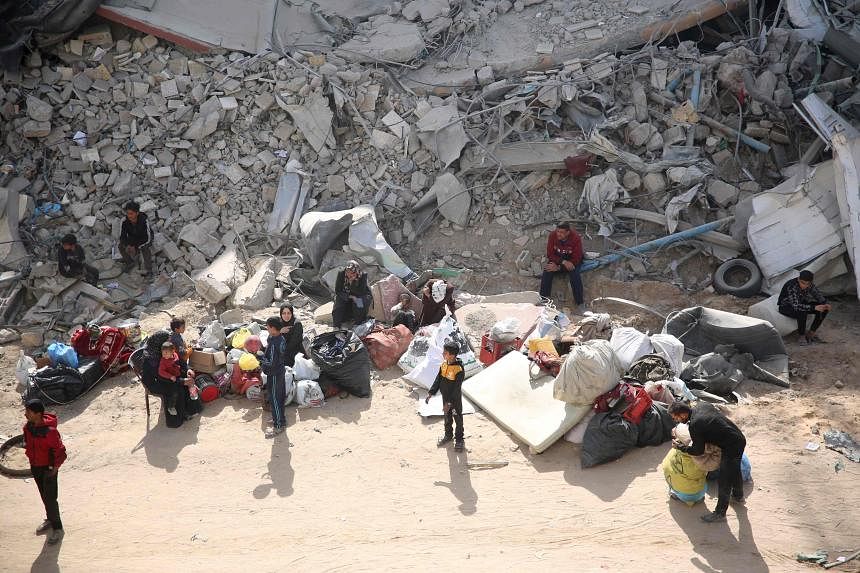SINGAPORE - The Israel-Hamas conflict is the top geopolitical concern in South-east Asia, a survey has found, with a large proportion of respondents concerned that Israel’s attack on Gaza has gone too far.
Concerns about the ongoing war in Gaza were especially acute in Muslim-majority countries in the Asean region such as Malaysia, Brunei and Indonesia, according to the ISEAS – Yusof Ishak Institute’s The State Of South-east Asia 2024 report published on April 2.
Among the 1,994 respondents polled across the 10 Asean nations, those from Singapore ranked the Israel-Hamas conflict as the top concern for the Republic as well.
First conducted in 2019, the annual survey aims to present a snapshot of the prevailing attitudes among people in a position to inform or influence policy on regional issues.
The 2024 edition was conducted online from Jan 3 to Feb 23 and polled respondents from academia, think-tanks, research groups, businesses, civil society, the media and regional or international organisations, as well as governments.
According to the survey results, the second-most concerning geopolitical event for Asean is aggressive behaviour in the South China Sea, where the Philippines and China have had a series of run-ins in the past year.
Unsurprisingly, respondents from the Philippines and Vietnam, another front-line South China Sea claimant state, ranked it as their country’s top concern.
The Russia-Ukraine war, which started in February 2022, and global scam operations were tied in third place for Asean’s top geopolitical concerns.
When polled about their views on the Israel-Hamas conflict, which began after Hamas militants attacked Israel on Oct 7, 2023, about two-fifths – or 41.8 per cent – of respondents expressed concern that Israel’s attack on Gaza had gone too far, with those in Brunei, Indonesia and Malaysia particularly concerned.
About a fifth of respondents – or 19.6 per cent – believed that Israel had the right to retaliate, subject to international law.
The top concern coming out of the conflict for the region is the rise of extremist activities impacting domestic and regional security. Respondents from Singapore, along with those in Cambodia and the Philippines, ranked this tops.
This is in line with their countries’ views, as Singapore and the Philippines have condemned Hamas’ attack on Israel as an act of terrorism, while Cambodia has denounced all acts of terrorism and violence against innocent civilians.
The second top concern is the diminished trust in international law and rules-based order, a sentiment that is particularly pronounced in Indonesia and Malaysia where there is strong support for the International Court of Justice case against Israel’s occupation of Palestinian territories.
Supporting a ceasefire and prioritising the provision of humanitarian aid received the most support among Asean respondents, when asked what the international community should do in response to the conflict.
Professor Danny Quah, dean of NUS’ Lee Kuan Yew School of Public Policy, said the survey findings clearly indicate that Muslims in South-east Asia have been deeply affected by the war in Gaza from the start, unlike the Russia-Ukraine war, which drew little reaction in the region until implications for grain and energy prices started to sink in.
“For the quarter of a billion Muslims in South-east Asia... the Israel-Hamas conflict will have a huge long-term impact on ordinary people’s views about the sanctity of international law and preservation of a rules-based order,” he said.
In the region, bread-and-butter issues such as unemployment and economic recession, along with climate change, continued to rank among the biggest worries, the survey findings show.
Supply chain disruptions impacting energy and food prices caused by the Israel-Hamas conflict and Houthi attacks in the Red Sea, along with China’s economic slowdown, could be some reasons for the economic worries, said the report.
The region continued to be concerned about a slow and ineffective Asean that is unable to cope with fluid political and economic developments, similar to findings in the 2023 survey.
There is an increased fear of Asean becoming an arena of major power competition and that its member states may become major power proxies, with respondents in Vietnam, the Philippines, Cambodia, Singapore and Laos choosing this option as their top concern about the bloc.
Professor Wu Xinbo, dean of the Institute of International Studies and director at the Centre for American Studies at Fudan University, said governments in Asean countries have done quite well in “acting diplomatically and cautiously”, so as not to be caught in the rivalry between China and the US.
“It is very clear that this kind of strategic competition launched by Washington against Beijing is not welcomed in South-east Asia, and most countries, with the exception of maybe the Philippines, do not want to become the geopolitical playground between them,” said Prof Wu, who was one of the panellists invited to discuss the survey findings in a webinar organised by the institute on April 2.
On Myanmar, a crisis in Asean’s own backyard following the February 2021 coup in the country, the largest proportion of respondents remain agnostic about the efficacy of Asean’s five-point consensus bringing about peace – at 31.1 per cent, similar to the 2023 survey.
To move the situation forward, independent dialogue with all key stakeholders, including with the National Unity Government and other entities, continued to be the region’s most favoured approach at 38.6 per cent. It is unanimously the top choice of respondents in all 10 Asean member countries, including Myanmar.
Meanwhile, more than a year on since the launch of the US-led Indo-Pacific Economic Framework for Prosperity (IPEF) in May 2022, sentiments surrounding its potential effectiveness and benefits have further waned in the region.
Positive sentiments about the IPEF declined to 40.4 per cent from 46.5 per cent in 2023, while the proportion of respondents who indicated they were unsure about the impact and effectiveness of the framework increased from the year before.
On soft power, more than a fifth of respondents stated their preference to live and work in an Asean country, if given an opportunity to relocate. Japan was the second-most popular option, followed by the US.
Among those who selected an Asean country, Singapore (28 per cent) emerged as the top choice, followed by Thailand (13 per cent).
Japan remained the most popular holiday destination, followed by an Asean country, and then South Korea.


